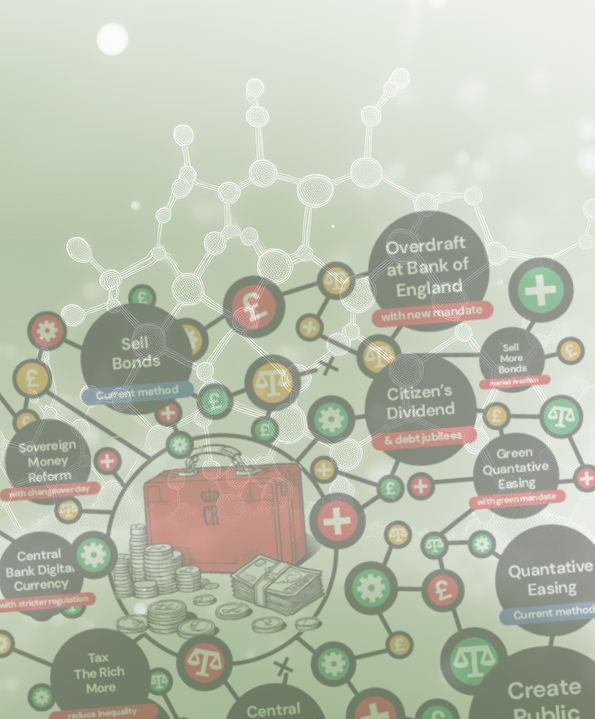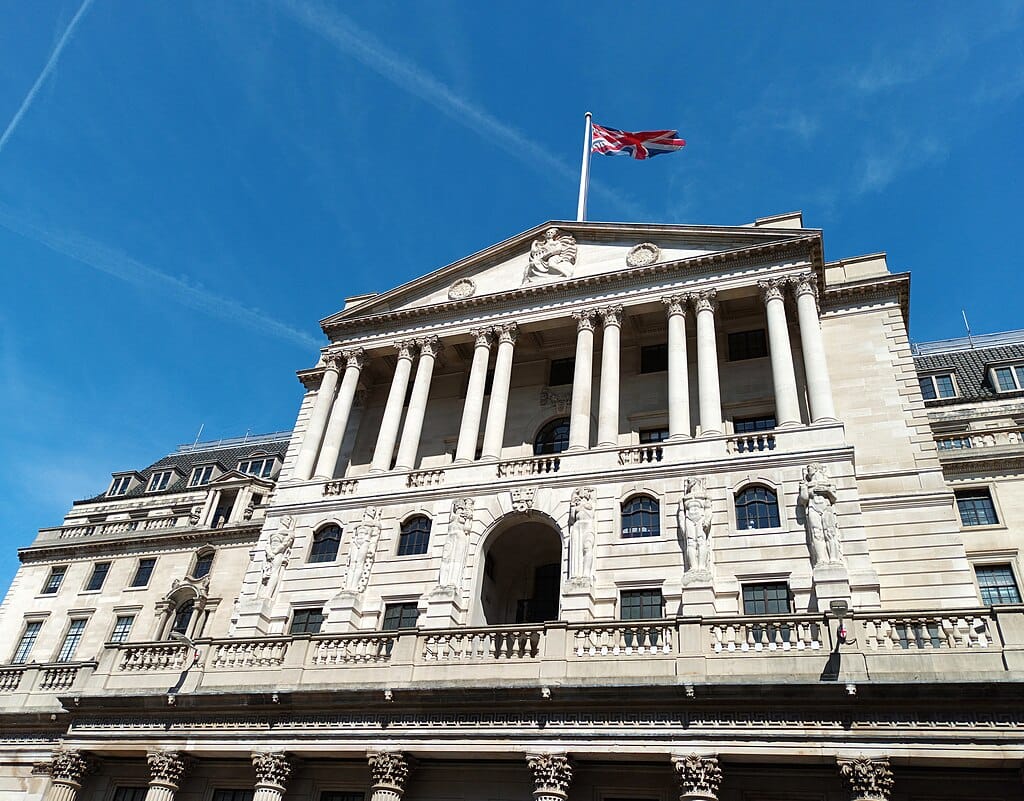
Briefing: Managing the UK Economy in times of the Climate Emergency
This briefing describes how the UK economy functions based on the works of many non-mainstream economists. It dispels the current economic orthodoxy of fiscal rules and taming inflation, shows banking is key for a thriving economy, and gives different options for funding public spending.
To have the best chance of successfully transitioning to an economy which is not dependent on fossil fuels, the economic system which drives human activity must be reorganised. The ‘needs’ of financial markets must become subordinate to the ‘needs’ of physics to maintain planetary conditions compatible with human civilisation. The mainstream consensus on how a national economy should be managed has little theoretical underpinning; rather, it has evolved with the massive growth in financial markets. The shortcomings of the mainstream consensus have been highlighted by non-orthodox economists for decades, but now more than ever this consensus needs to be reassessed as it is limiting our response to the climate emergency as well as causing unnecessary austerity and hardship. This briefing aims to explain descriptively how a national economy works, how the current consensus is limiting what we can achieve, and how the UK economy could be managed differently.
The key insights
The UK state can afford to obtain and maintain a good level of public services as well as to build infrastructure for transitioning to a low carbon economy:
1 It is always possible for the UK government to find money so long as it has its own sovereign currency. The availability of money does not depend on the tax intake or on the government being able to sell bonds. For the UK this would no longer be the case if it adopted the euro.
2 Actual limits on what can be achieved depend on the number of healthy workers and the available resources for energy, materials and space. In the short term, further limitations include the number of skilled workers, available machines, and organisations set up and ready to provide the goods or services.
3 The downside in over-investing in public services or projects is that workers and resources are not available for private businesses to employ/use.
Good regulation around banking promotes a thriving economy:
4 A thriving economy needs small and medium sized enterprises to be able to easily access funds. This is especially true in times of upheaval where regulations or resource limitations are changing the way goods and services are produced and delivered – as will be true for the transition to a low carbon economy.
5 Measures introduced to increase the financial robustness of banks can, counter-intuitively, destabilise the economy by dis-incentivising banks from providing bank loans to businesses.
Some financial instabilities are problematic, others less so:
6 The build-up of too much private debt can lead to a financial crisis, whereas the build-up of national debt is not inherently problematic. High amounts of private debt associated with non-productive assets can result in a financial crisis, with banks potentially failing.
7 A financial crisis that disrupts transactions between businesses and individuals must be averted at all costs, including by bailing out banks if necessary. Failure of the payment system such that, for example, salaries could not be paid, would cause massive and immediate problems so must be averted. Stricter regulation for shadow banks or (more drastically) changing to a Sovereign Money system with a publicly run clearing system would help prevent this issue.
8 Inflation does not prevent an economy from thriving. However different segments of society may be adversely affected by inflation (or deflation).
Alternative policies can promote a fairer economy:
9 In inflationary times, a cost-of-living crisis must be avoided for the least well-off in society by ensuring their incomes rise in tandem with their necessary outgoings.
10 In the case where there is a shortage of a key product (e.g. food staples), rationing is the pragmatic response. Otherwise the product may become unavailable due to hoarding or prohibitively expensive.
11 The problem of inflation in house prices – resulting in housing becoming increasingly unaffordable – is partly due to the fact that banks create new money when they give mortgages, which pumps up the housing market. This could be prevented by only allowing banks to act as intermediaries between savers and borrowers (by pooling people’s savings and using these to offer mortgages).
Input from a broader range of economic schools of thought can improve policymaking:
12 A broader variety of methods for economic modelling and forecasting should be used for policymaking than is the case today. These should include: modelling the stocks and flows of money in an economy, modelling the economy as a complex adaptive system, and using the double-entry bookkeeping techniques. In general, models should include banking, as what banks create money for strongly influences which sectors will prosper, and how much money and debt banks create will affect financial stability.
13 Taxation and/or the issuing of government bonds can be tools to suppress or delay demand to prevent an inflationary wage–price spiral.
14 Taxation can direct people’s spending – for instance, away from fossil fuels into low carbon products. The carbon fee and dividend policy, for example, could be used to direct spending away from carbon without disadvantaging the least well-off in society.
These key insights challenge mainstream beliefs about the economy and naturally lead to alternative economic policies. However, in deviating from mainstream norms, a government must be prepared for potential adverse reactions from financial markets. Participants in these markets prioritise profits above all else. There is no inherent reason to expect the sum of their unrestrained actions to steer governments – and people more generally - towards maintaining the conditions necessary for human civilization to thrive. On the contrary, mounting evidence suggests the opposite is the case.
Related Publications:







